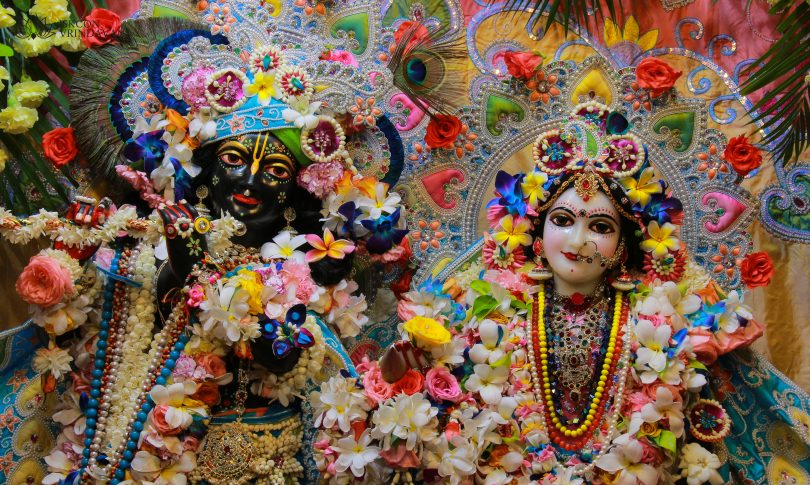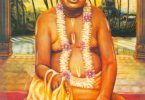Question: Recently during the Christmas holidays, it was noted that certain temples under ISKCON management were dressing the Deities with the outfits of father Christmas and so the question is if it is bona fide to do this. This kind of dressing didn’t happen when His Divine Grace Srila Prabhupada started the movement and the Nectar of Devotion and Deityworship.com manual outlines many important details on how deity dressing and deity worship is to be done. So is this new dress for Deities something that the headquarters in Mayapur approved? Of course Sri Sri Radha Krishna will accept if a paraphernalia is offered with love and devotion to them. But a practitioner is to offer the best to Krishna. There are many imaginary characters (which in some ways may be similar to father Christmas) but I don’t see a need to dress Sri Sri Radha Krishna in the dress of such characters. Since everything about Krishna (what He eats, how He dresses, etc.) is given in the scriptures, then being conscious of Krishna in the way he has stated in the scriptures would be ideal, rather than doing something differently. Please guide me if my thoughts is a result of my lack of the depth of understanding of our Vaisnava philosophy.
Answer by Romapada Swami: (written by a member of the Deity Worship Ministry)
The ISKCON Deity Worship Ministry does not condone ISKCON temple deities being dressed in a non-traditional fashion. While we are aware of and have addressed incidents in the past where ISKCON temples have performed non-traditional dressing, we are not aware of any incidents this last holiday season that were brought to the Ministry’s attention. If any devotees have knowledge of recent or future occurrences, we encourage them to bring this to our attention.
We should perform deity worship according to the instructions we are given by guru, sadhu, and sastra. Lord Krishna personally instructs Uddhava in Srimad-Bhagavatam:
“In worshiping the temple Deity, my dear Uddhava, bathing and decoration are the most pleasing offerings.” (SB 11.27.16)
Thus, we understand that dressing and decorating are very important aspects of worship. However, we should offer this worship with reverence. Srila Prabhupada offers the following instructions to his disciples in this matter:
“…Krsna as He is appearing in our temples is in the kaisora age, and the dress which I have introduced is His dress of kaisora age. In our temples the Deities Radha and Krsna are worshiped as Laksmi-Narayana with all the opulences of Their Majestic Lordship in Dvaraka. The worship of Radha-Krsna as They appear in Vrndavana is a very advanced stage, so we worship Them in the temples as Laksmi-Narayana. Actually there is no difference because Laksmi-Narayana is directly the expansion of Radha- Krsna. We are following the prescribed method of temple worship as it is the effective program for developing the highest perfection of pure love of Krsna.” (SPL to Yamuna, January 16th, 1970)
“You may dress Lord Caitanya in the standard way, main thing is do it nicely, don’t make it funny…” (SPL to Dhruvananda, 4th January, 1973)
Additionally, offering love and devotion to Krishna is not such a quick and easy thing to develop. If we take things cheaply, we will not make spiritual progress. Therefore we are advised to worship according to the viddhi-marga principles, or according to rules and regulations. Even as our love develops as we enter into raga-marga, or spontaneous devotion, externally our worship largely appears the same. Sivarama Swami sums up a nice explanation in his book, Suddha Bhakti Cintamani, based on Srila Prabhupada’s instructions as follows:
“Devotees first worship Radha and Krsna with reverence, the mood of worship offered to Laksmi-Narayana. As they advance, their mood becomes more spontaneous, although their external worship remains formal and regulated.”
The deity worship in ISKCON is performed according to the rules of regulative devotion, technically known as pancaratrika-vidhi. Srila Prabhupada refers devotees to The Nectar of Devotion for directions on how to perform this kind of deity worship, and he personally taught this process when he installed Radha and Krsna deities in London and New York and the world over.
In regulative reverential worship, Radha and Krsna reciprocate in the mood of Laksmi-Narayana. Neophyte devotees who avoid the sixty-four offences in deity worship are gradually purified and raised to what Srila Prabhupada calls the “Vrndavana platform,” the path of spontaneous devotion. [Srimad-Bhagavatam 4.24.45–46, purport] In this advanced stage, devotees worship Radha and Krsna with natural attraction, and Their Lordships reciprocate with them accordingly.
Does this mean that as devotees advance to the spontaneous platform the standard of deity worship in ISKCON should change?
No, it should not change because there will always be neophyte devotees visiting or joining the temples and deity worship should always be suitable for them. Otherwise, beginners will not become fixed in the essential principles of regulative devotion and may become sahajiyas. Advanced devotees need not change the external form of their worship. They need only change their mood of worship, which develops naturally, without external adjustment. The same may be said of home deities, the worship of whom must be suitable for younger, less advanced members of the family, what to speak of for future generations.
Thus the worship of Radha and Krsna follows the regulative pancaratrika- vidhi. For devotees faithful to Srila Prabhupada’s teachings, the mood of regulative worship gradually transforms into the spontaneous mood of raga-marga, the “Vrndavana platform.” Yet to the observer, both the neophyte and advanced devotee appear to be engaged in the same type of worship — the regulative worship characteristic of service to Lord Narayana. Readers may consult Srila Prabhupada’s teachings on this matter. [Srimad-Bhagavatam 4.24.45–46, purport]
mukhy vraja-vsi-janeragatmika-bhakti — ‘mukhya vraja-vasi-jane
tara anugata bhaktira ‘raganuga-name
The original inhabitants of Vrndavana are attached to Krsna spontaneously in devotional service. Nothing can compare to such spontaneous devotional service, which is called ragatmika bhakti. When a devotee follows in the footsteps of the devotees of Vrndavana, his devotional service is called raganuga bhakti. Sri Caitanya-caritamrta, Madhya-lila 22.149
Jayananda dasa
ISKCON Deity Worship Ministry, North America







